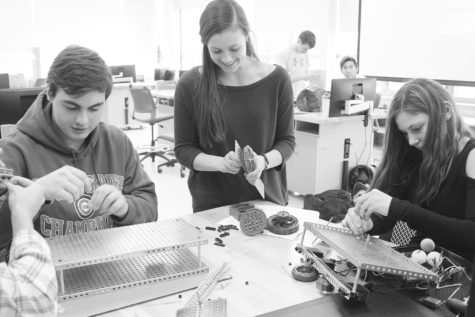New classes cater to students’ interests

Introduction to Yoga
Yoga is planned to be offered to junior and senior students starting in the 2017-2018 school year. The course will be a one-semester P.E. elective with no prerequisites.
P.E. teacher Tiffany Kim, who is a certified yoga instructor, is set to teach the class.
The main reason the class will be offered to students next year is to expand upon the yoga techniques that are already taught in some P.E. classes and sports, said Kim.
Students will learn proper alignment and how to breathe correctly to help alleviate stress and anxiety. This course will also improve strength, flexibility, focus, discipline and endurance, according to Kim.
Kim said yoga is beneficial in developing one’s self-esteem, and she hopes that students will do it regularly outside of class once they learn the proper techniques in this new class.
“Just because someone can touch their toes doesn’t mean someone is better than someone else,” said Kim. “Everyone has their own body, and body image is a huge thing with these students, so just accepting your body will be [a main takeaway of the class].”
Freshman Megan Fahrney said she would be interested in doing yoga more often due to the health benefits it provides and is a little disappointed that it is not being offered to freshmen and sophomores next year.
“I know [yoga is] good for flexibility and posture … ,” said Fahrney. “[And], I would want to take it to get a break from the day.”
AP Computer Science Principles
AP Computer Science Principles is set to be a single-block, full-year elective offered to sophomores, juniors and seniors. The course is scheduled to be implemented at the start of the 2017-2018 school year without any prerequisites.
The addition of AP Computer Science Principles marks the second consecutive year a computer science class will be added to the curriculum.
Business education teacher Joseph Bruno, who is scheduled to teach the class, said the difference between AP Computer Science Principles and AP Computer Science A is that the latter is focused on skills relating to programming and coding in Java. In the new course, multiple programming languages will be covered in addition to algorithms, cybersecurity concerns and large data sets.
According to Bruno, the new class will serve as an introductory course to give students a well-rounded understanding of the general concepts of computer science and ideally should be taken before AP Computer Science A.
“[Computer science] is a field that is growing immensely, and since [this class is] in career and technical education, we want our students to get a background in something they can potentially use in the future,” Bruno said.
Junior Grace Sullivan said this class will be helpful in applying computer science to a variety of fields.
“Computer science could be an important part in [engineering],” said Sullivan. “I think coding is something useful in every single job and every area of study.”
Project Lead the Way Digital Electronics
The District 225 Board of Education approved the addition of Project Lead the Way, also known as PLTW, Digital Electronics beginning in the 2017-2018 school year.
The course, which is set to be the fourth PLTW class, is planned to be a full-year honors class offered to juniors and seniors.
The prerequisites include Introduction to Engineering Design, also known as IED, and Principles of Engineering, also known as POE.
According to Mary Kosirog, instructional supervisor for career and technical education, she and the District 225 Board of Education are in the process of selecting someone to teach Digital Electronics.
Kosirog said this course was implemented to make a four-year sequence in engineering available and to expose students to another field of engineering.
“There is going to be a lot of circuitry and how to control analog and digital signals because that’s the foundation of cell phones, computers and all electronics,” said Kosirog. “So, [students will learn] about how that works, but kind of in the same way of how we learn in the other [PLTW] classes. So, there is a lot of design thinking, collaboration working and teams to solve the problems.”
Junior Sam Erens said he has taken the first two introductory classes and is heavily considering taking Digital Electronics.
“It seems [like] a way for [students] to develop their interest in engineering,” said Erens. “It seems like it would go deeper into electronics than IED or POE did, and I think that’s more useful for people like me who are maybe not as interested in [PLTW] Civil Engineering and Architecture but [are] more interested in that kind of stuff.”
Kosirog said the ability to receive college credit in PLTW courses will be helpful for students in the future.
“One of the benefits for taking some of these [PLTW] courses that students like is it’s similar to AP,” said Kosirog. “There’s an end-of-course assessment where students, if they score within a certain range and they get a certain score in the class, they can receive college credit. So the more classes you’re taking in the sequence, you can get college credit and/or scholarships or preferred admission to schools if you’re planning [to pursue] engineering.”
Additional courses and archives
The District 225 Board of Education has also approved the addition of Honors Mandarin Chinese 573 beginning in the 2017-2018 school year. The teacher will be Mandarin Chinese teacher Wanyin Chou, and students must have taken Chinese 473 as a prerequisite or must be recommended by their Mandarin Chinese teacher with department approval in order to take the new class.
According to the Curriculum and Course Adoption Proposals for 2017-2018, Metal Tech 163 and 263 and Multimedia Applications 261 will no longer be offered due to low enrollment.

